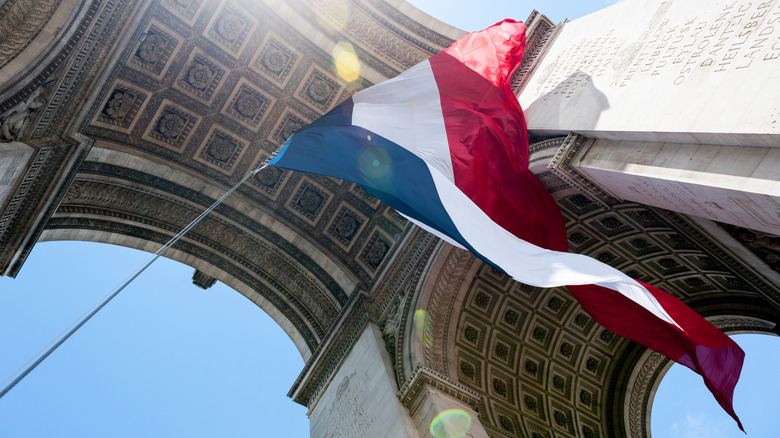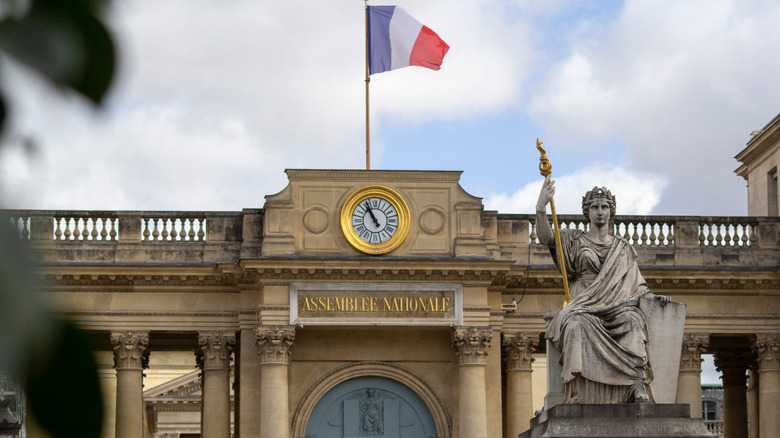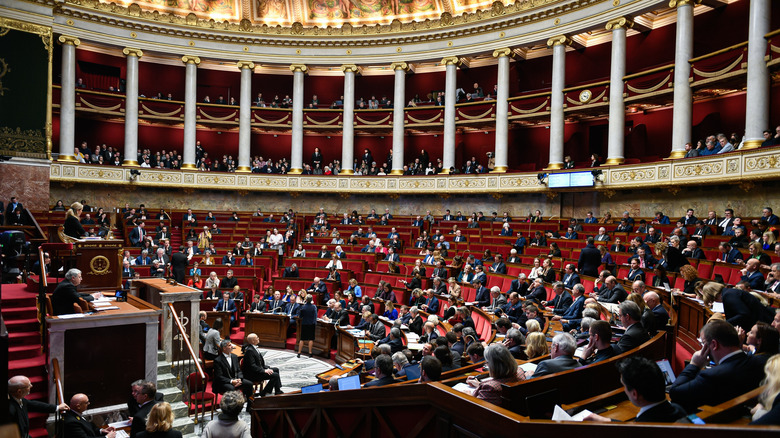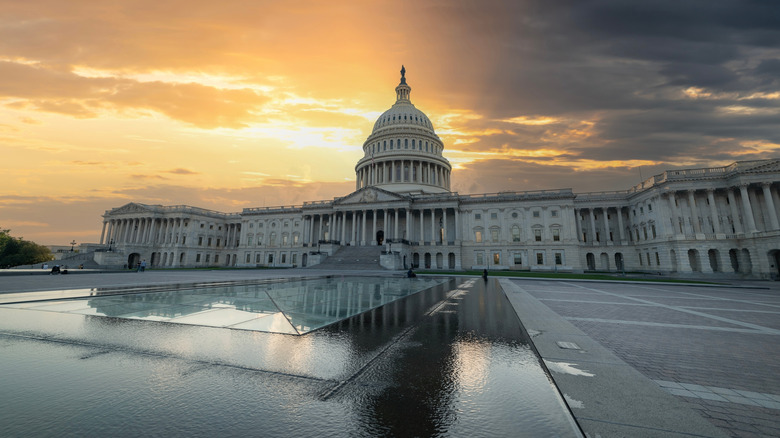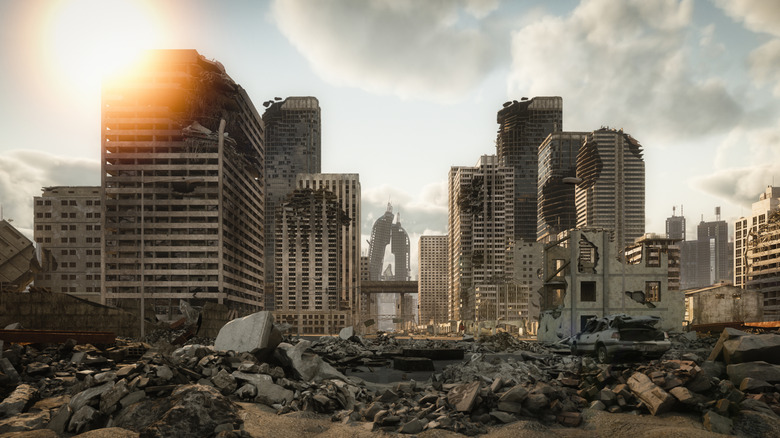Here's What Happens When A Government Collapses
Those keeping an eye on the news lately might have noticed headlines saying something along the lines of "France's government has collapsed. "Collapsed" is a somewhat troublesome word that'll likely catch people's eye. But before we go further, let's clarify: No, the entirety of France has not turned into a scene from "The Purge" movies full of shattered store windows, Molotov cocktails detonated on lovely Parisian facades, ersatz guillotines erected on sidewalks, and so forth. "Collapsed" means that the prime minister, Michael Barnier, got fired. That's it.
Granted, there are plenty of historical examples when a collapse of government really meant full-on societal "collapse," as in: The government is gone and the rule of law is shattered. Crusader states in the Levant rose in 1098 following the First Crusade's successful recapture of Jerusalem and collapsed by 1291 due to incessant Muslim invasions on top of governmental mismanagement. Ancient Sumer arose about 4,500 B.C.E. and by about 2,000 B.C.E. got absorbed into other civilizations. But did its government ever "collapse," or just transition into a new form? There's no way to tell. There were three French Revolutions in 1789, 1830, and 1848, the first of which resulted in dictator Napoleon Bonaparte taking control. Bonaparte outright disbanded France's governing body, the Directory, but life continued for the nation's citizenry.
From these examples alone we can see that definitions of collapse vary from place to place and time to time. There's also a difference between governmental collapse and overall societal collapse. Looking to France's current situation, the government's collapse is more of a bureaucratic faceplant than anything else, one with precedent in place for how to proceed from here.
How has France's government 'collapsed'?
In order to understand what's going on in France we've got to understand the French government. The French government is what's called a "coalition" defined by a variety of political parties all working together. Such parliamentary governments account for 146 governments across the world. These kinds of governments are inherently complex and often messy, depend on consensus building and cooperation between factions, and have a lot of moving parts to produce simple outcomes. A lot would have to happen simultaneously for it to truly "collapse," as in chaos in the streets. That hasn't happened in France.
Looking to said complexities: PolitoPro overviews 21 French political parties — yes, 21 — and where they fall on the political spectrum. Five of these parties could be considered "major." The last 2022 French presidential elections saw 12 candidates enter the voting ring, and popular vote reelect President Emmanuel Macron for a second term. In France, the president appoints the other big governmental figure, the prime minister (PM), who chooses people for governmental positions. The president then approves these appointments or not. Like we said: cooperation.
But what happens when cooperation breaks down? For that, we turn to France's parliament (legislative branch), divided into two houses: the Senate and the National Assembly, the latter being composed of 577 seats. Currently, 331 out of 577 of these people are set to pass a vote of no confidence (we don't support you) against the current PM, Michel Barnier, who's held the office only since July 2024. Soon, there'll be no French PM, and that's why it's said — rather dramatically — that France's government has "collapsed."
What happens in France now?
It's important to note we could be looking at a very different situation if the government of another country "collapses" — something more along the Molotov cocktail and roadside guillotine lines. But if a government is structured in a robust way and with a clever set of interlocking rules, then a nation won't simply cease functioning if it momentarily fails, kind of like a healthy person won't spontaneously die if he gets a cold. After all, what about all the shopkeepers, butchers, cafes, Uber drivers, trains, schools, etc., across France? Is everyone going to cease living their lives and stop needing milk, gas, transportation, and so forth, if there's no French prime minister for a while? Of course not.
But, therein lies the pertinent question that requires addressing: What happens now? As stated, if there's no PM then the president chooses a PM. However, French President Emmanuel Macron chose the last PM, and the National Assembly basically said, "Nope." Macron is deeply unpopular in France at the moment, which might have contributed to people's distaste of his PM choice, Michel Barnier. Critically, Barnier passed a 2025 budget without parliament's approval.
As Le Monde says, Macron is under no obligation to choose a new PM anytime soon. He can also choose whomever he wants but is usually pressured to choose someone folks generally approve of to avoid exactly what happened. And, you can be sure he'll be super careful with his next choice. In the meantime, a "caretaker" government composed of a variety of ministers can operate day-to-day affairs, but can't do certain things like make new laws.
Roads forward to France's future
At this point, the reader can see how the word "collapse" conjures visions far more cataclysmic than reality's mundane bureaucratic peculiarities. In the case of France's governmental collapse, as in any other modern democratic nation, those in power refer back to the laws of the land and follow their blueprint — their constitution — to a natural conclusion. This solution is simultaneously simple and easier said than done.
No confidence votes have happened before in France, if infrequently. The last time was in 1962 when President Charles de Gaulle dissolved the National Assembly, the same body that initiated the current no confidence vote. Back in 1962, there was a vote for new assembly members and the PM stayed in office — problem solved. The most difficult time in recent French history occurred from 1947 to 1958 when the country cycled through no less than 20 governments.
At present, The Conversation outlines three possible paths forward for France. First, President Emmanuel Macron could gather support from conservative-leaning parties in the coalition and choose a new PM from them, one that the National Assembly won't reject. Or, he could push the other way and collect centrist coalition members into France's political left and choose a PM from them. Either outcome will result in difficult goings-on in parliament. Or, Macron could reappoint Michel Barnier under the condition that Barnier's proposed budget — the sticking point for the National Assembly — gets redrafted.
Defining 'collapse' in the United States
The intricacies of the French government's "collapse" — i.e., the prime minister is getting fired — illustrate exactly how complex governmental collapses are in general. The current situation in France represents one scenario in one nation out of the entire Earth, each with its own structure, legalities, pitfalls leading to collapse, and recourses leading to renewed stability. It's an impossible task to run through scenarios for each and every nation. The most we can do is conduct a thought experiment regarding what would happen if a country like the United States came across a similar situation.
It's tricky defining "collapse" in U.S. terms. Sources online approach this topic in the most predictably hyperbolic way possible. They conflate governmental trip-ups with the annihilation of civilization. Sources like the Cascade Institute in 2022 talked about Canada needing to be prepared in case the U.S. goes off its political rocker and plummets towards "right-wing dictatorship" territory because "we live in a world where the absurd regularly becomes real and the horrible commonplace." Declassified UK similarly talks in grand terms about "the late stage of empire" and its "hidden machinery," including, "brutality, mendacity, cruelty, and its dangerous self-delusions."
All such sources are light on specifics, high on doom, and do little to help clarify ground-level realities. If the U.S. government "collapsed," it would first take the form of a pedestrian hiccup of governmental gears similar to what France is currently experiencing, not complete and utter bedlam and blood in the streets. Think about a presidential impeachment. There's a procedure, folks follow the procedure, the procedure produces known outcomes, and life goes on.
The worst-case collapse scenario
We can all imagine the worst-case outcome for what it would look like if a governmental collapse in the United States or elsewhere really did somehow cascade into the end of days. This scenario has been depicted across countless media and continues to preoccupy the imagination of the public. Think: the COVID-19 toilet paper shortage times a bajillion. Neighbors slaughtered for Evian bottles, machetes to the heads of home intruders, fathers pointing shotguns at the entrances to underground bunkers as dirty children huddle and weep in the background, rampaging hordes frolicking in the blood of the innocent and the damned, etc. — you get the idea. This is a complete and utter collapse not only of government, but society and civilization writ large. Checkmate, humanity.
Physical violence, absent power grids, no food and water: Such effects would remain local. But because we live in a completely interconnected world, a societal collapse in the United States wouldn't be confined to the United States. Financial services group Encompass Advisors says that it would economically ripple across the world and cause hyperinflation along the lines of what happened after World War I in Germany when a common anecdote said that a wheelbarrow of money couldn't buy a newspaper. Then there's full-blown economic depression and a lack of jobs, bank systems collapsing (which would cause electronic payment methods to fail), the devaluation of currency (the U.S. dollar is the world's reserve currency), and no municipal upkeep related to infrastructure, road maintenance, trash collection, and so forth. That's the absolute worst-case outcome of governmental collapse, one that we hope we never see.
